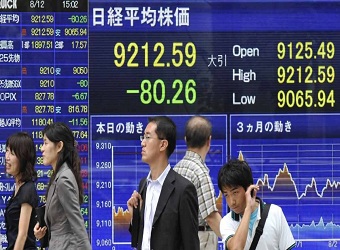Traders in Asia shake off North Korea’s latest provocation, following stronger lead from Wall Street
Japan’s Nikkei 225 added 0.55 percent. Across the Korean strait, the Kospi edged up 0.04 percent, as tech stocks made gains following Tuesday’s sell off on North Korea’s missile launch: SK Hynix rose 0.89 percent and Samsung SDI was up 2.7 percent.
Down Under, the S&P/ASX 200 slid 0.19 percent, with a 5.76 percent fall in the telecommunication services sub-index offsetting moderate gains in the information technology and consumer staples sectors.
Greater China markets were mixed. The Hang Seng Index rose 0.79 percent. Mainland markets turned in a more subdued performance: The Shanghai Composite shed 0.03 percent while the Shenzhen Composite tacked on 0.293 percent.
Stocks in Asia had closed down on Tuesday following a North Korea ballistic missile launch earlier in the day. Still, most major indexes closed above the lows they touched earlier in the session, with risk aversion later fading further during the U.S. trading session.
“The risk off sentiment that overshadowed markets after the launch of yet another missile from North Korea didn’t even last 24 hours,” said National Australia Bank Director of Economics David de Garis in a morning note.
President Donald Trump said Tuesday that “all options” were on the table when it came to North Korea. Some market watchers, however, took the statement to be a reassuring development compared to Trump’s past responses over tensions on the Korean peninsula.
On the energy front, at least 19 percent of refining capacity in the U.S. was shut down due to weather conditions caused by Tropical Storm Harvey, a now-downgraded hurricane. Flooding in Houston could likely keep some refiners shut for the week, analysts said.
U.S. gasoline futures surged 3.13 percent to trade at $1.8391 a gallon following refinery closures stateside. Gasoline futures had settled up 4 percent overnight. Meanwhile, Brent crude futures slid 0.37 percent to trade at $51.81 a barrel and U.S. crude futures lost 0.28 percent to trade at $46.31.
In corporate news, Toshiba could miss an Aug. 31 deadline set by itself to sell its memory chip unit, Reuters reported. Toshiba shares were down 2.51 percent despite most Japanese tech stocks making gains.
The latest stumbling block faced by Toshiba was a disagreement between parties over the size of Western Digital’s share in the business, Reuters added. Western Digital is part of a consortium, including Innovation Network Corporation of Japan, reportedly offering just below 2 trillion yen for Toshiba’s memory business.
Meanwhile, LG Electronics made a bid for Austrian headlight maker ZKW Group, Reuters said on Tuesday citing Korea Economic Daily. A preferred bidder will reportedly be chosen in September, Reuters added. LG Electronics stock surged 7.8 percent, outperforming other South Korean tech stocks.
Shares of Australia’s largest telco, Telstra, were in the spotlight after falling almost 8 percent earlier in the session. The move in share price came after Telstra announced Wednesday it would be abandoning a plan to monetize future income from National Broadband Network. Telsta stock was last down 6.12 percent on the day.
Market movers also included several companies that released half-year earnings after the Tuesday market close. Hong Kong-listed shares of China Southern Airlines were up 4.74 percent after the airline announced Tuesday that its first-half profit had fallen 11 percent. Shares of the company traded on the mainland jumped 5.81 percent.
Also in the airline space, shares of China Eastern Airlines traded in Hong Kong gained 3.55 percent after it reported first-half profit jumped 34 percent. Shares of China Eastern traded on the Shanghai Stock Exchange were up 2.43 percent.
The jump in Chinese airline shares came as the People’s Bank of China set the yuan reference point at 6.6102 yuan to the dollar, its strongest in more than a year, Reuters said. The carriers tend to do better when the greenback is weaker as that affects their fuel costs.
In currencies, the dollar edged down against a basket of currencies to stand at 92.274 at 11:52 a.m. HK/SIN. The dollar index had fallen as low as 91.621 in the overnight session before recovering to close at 92.350.
“With [the] almost 10 percent dollar index decline year-to-date, the overnight bounce must be taken in the context of extended dollar shorts. And so is at best shallow, if not a dead cat (bounce),” said Mizuho Bank Head of Economics and Strategy Vishnu Varathan in a morning note.
The greenback also recovered from a 4-1/2-month low against the Japanese currency hit after North Korea’s Tuesday missile launch. The dollar last fetched 109.74 yen, firmly above the lows of 108.82 yen plumbed earlier this week.
That followed the release of Japan retail sales for the month of July, which increased 1.9 percent compared to one year ago, Reuters reported. The figure was above the 1 percent rise forecast, Reuters added.
Meanwhile, the euro edged down to trade at $1.1980 after breaking the $1.20 level overnight.
Ahead, investors awaited ADP employment numbers and revised second-quarter U.S. GDP data due during U.S. hours.
Markets also awaited details on the Trump administration’s tax reform proposal. Few specifics are expected, but a Wednesday speech is likely to touch on the matter of removing deductions that tend to benefit those with higher incomes, according to a Politico report.
Source: CNBC


